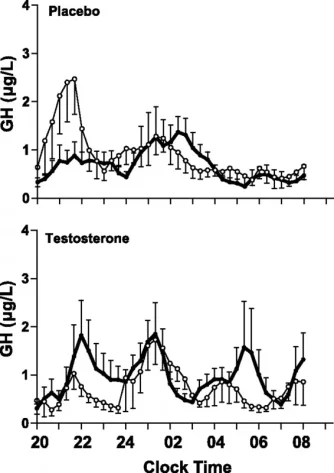Nelson Vergel
Founder, ExcelMale.com
Even though this study used a low dose of testosterone (100 mg every two weeks of testosterone enanthate injections) in older men with low T, it showed that T supplementation can increase night time growth hormone output.

Long-term testosterone supplementation augments overnight growth hormone secretion in healthy older men
- Endocrinology and Metabolism Published 1 September 2007 Vol. 293 no. E769-E775
Circulating testosterone (T) and GH/IGF-I are diminished in healthy aging men. Short-term administration of high doses of T augments GH secretion in older men. However, effects of long-term, low-dose T supplementation on GH secretion are unknown.
Our objective was to evaluate effects of long-term, low-dose T administration on nocturnal GH secretory dynamics and AM concentrations of IGF-I and IGFBP-3 in healthy older men (65–88 yr, n = 34) with low-normal T and IGF-I.
In a double-masked, placebo-controlled, randomized study we assessed effects of low-dose T supplementation (100 mg im every 2 wk) for 26 wk on nocturnal GH secretory dynamics [8 PM to 8 AM, Q20 min sampling, analyzed by multiparameter deconvolution and approximate entropy (ApEn) algorithms]. The results were that T administration increased serum total T by 33% (P = 0.004) and E2 by 31% (P = 0.009) and decreased SHBG by 17% (P = 0.002) vs. placebo.
T supplementation increased nocturnal integrated GH concentrations by 60% (P = 0.02) and pulsatile GH secretion by 79% (P = 0.05), primarily due to a twofold increase in GH secretory burst mass (P = 0.02) and a 1.9-fold increase in basal GH secretion rate (P = 0.05) vs. placebo. There were no significant changes in GH burst frequency or orderliness of GH release (ApEn). IGF-I levels increased by 22% (P = 0.02), with no significant change in IGFBP-3 levels after T vs. placebo.
We conclude that low-dose T supplementation for 26 wk increases spontaneous nocturnal GH secretion and morning serum IGF-I concentrations in healthy older men.

Long-term testosterone supplementation augments overnight growth hormone secretion in healthy older men
- Endocrinology and Metabolism Published 1 September 2007 Vol. 293 no. E769-E775
Circulating testosterone (T) and GH/IGF-I are diminished in healthy aging men. Short-term administration of high doses of T augments GH secretion in older men. However, effects of long-term, low-dose T supplementation on GH secretion are unknown.
Our objective was to evaluate effects of long-term, low-dose T administration on nocturnal GH secretory dynamics and AM concentrations of IGF-I and IGFBP-3 in healthy older men (65–88 yr, n = 34) with low-normal T and IGF-I.
In a double-masked, placebo-controlled, randomized study we assessed effects of low-dose T supplementation (100 mg im every 2 wk) for 26 wk on nocturnal GH secretory dynamics [8 PM to 8 AM, Q20 min sampling, analyzed by multiparameter deconvolution and approximate entropy (ApEn) algorithms]. The results were that T administration increased serum total T by 33% (P = 0.004) and E2 by 31% (P = 0.009) and decreased SHBG by 17% (P = 0.002) vs. placebo.
T supplementation increased nocturnal integrated GH concentrations by 60% (P = 0.02) and pulsatile GH secretion by 79% (P = 0.05), primarily due to a twofold increase in GH secretory burst mass (P = 0.02) and a 1.9-fold increase in basal GH secretion rate (P = 0.05) vs. placebo. There were no significant changes in GH burst frequency or orderliness of GH release (ApEn). IGF-I levels increased by 22% (P = 0.02), with no significant change in IGFBP-3 levels after T vs. placebo.
We conclude that low-dose T supplementation for 26 wk increases spontaneous nocturnal GH secretion and morning serum IGF-I concentrations in healthy older men.











